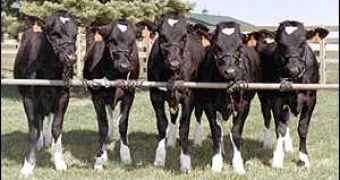A prejudice has been surpassed: last week the U.S. Food and Drug Administration (FDA) approved consumption of meat and milk from some species of cloned, food-producing animals.
"Meat and milk from some species of animal clones - so far cattle, swine, and goats - and their non-cloned offspring are safe to eat is a good one. FDA experts have carefully studied all available scientific reports about animal cloning for more than five years", said Dr. Gary Weaver, Director of the Program on Agriculture and Animal Health Policy, Center for Food, Nutrition, and Agriculture Policy (CFNAP) at the University of Maryland.
FDA experts found that meat and milk from cloned animals and their non-cloned offspring are indistinguishable from those of traditional animals.
"In fact, the only way to positively identify a clone is to certify that it has virtually the same genetic material as another animal that is not its identical twin."
Cloning process just makes the genetic material from the donor with the desirable traits not diluted as it is in natural reproduction, when all genetic materials from both parents are randomly mixed.
The cloning process isolates a donor animal cell nucleus, placing it after that into a recipient's egg with its nucleus removed and the resulting embryo is transferred to a female womb: clones have a mother; they do not develop in a test tube or incubator.
This way, the clones and their non-cloned offspring bear only the high quality genes of the traditional, non-cloned animals. Clones are used to reproduce non-cloned offspring that also have only traditional animal genes.
Thus, a clone is not a genetically modified organism, because transgenic animals contain deliberately added foreign genes. "The concern about the cloned animals comes from some organizations that claim the animal cloning is unnatural human intervention."
"Today, all breeds of cattle, dogs, cats, pigs, horses, chickens, plus all other domestic animals are the direct result of intensive, unending, human intervention using selective animal breeding programs for millenia. None of today's domestic animal breeds would ever have developed using only natural selection and random breeding."
Nature would have not produced Holstein cows or Chihuahua dogs. "Cloning allows livestock producers to reduce, by years, the decade or so now required to get superior animals to market with the newly-identified, superior genetic traits of male animals which are then placed in artificial insemination breeding programs."
"USDA prime beef - currently about 3 % of all beef steaks - could become our only grade of beef - and at affordable prices! Also, fewer superior dairy cows could produce the same quantity of milk while making less animal waste." But, for now, cloned animals are too expensive to eat: rather cloned animals will be breeding stocks of superior quality traits.

 14 DAY TRIAL //
14 DAY TRIAL //